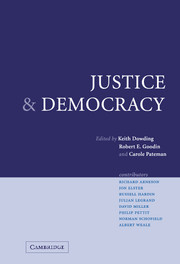Book contents
- Frontmatter
- Contents
- List of figures
- List of contributors
- 1 Introduction: between justice and democracy
- 2 Are democratic and just institutions the same?
- 3 Democracy is not intrinsically just
- 4 ‘The probability of a fit choice’: American political history and voting theory
- 5 Contractarian theory, deliberative democracy and general agreement
- 6 Democracy, justice and impartiality
- 7 Mimicking impartiality
- 8 Justice, democracy and public goods
- 9 The common good
- 10 Individual choice and social exclusion
- 11 Subnational groups and globalization
- References
- Brian Barry's publications
- Index
2 - Are democratic and just institutions the same?
Published online by Cambridge University Press: 22 September 2009
- Frontmatter
- Contents
- List of figures
- List of contributors
- 1 Introduction: between justice and democracy
- 2 Are democratic and just institutions the same?
- 3 Democracy is not intrinsically just
- 4 ‘The probability of a fit choice’: American political history and voting theory
- 5 Contractarian theory, deliberative democracy and general agreement
- 6 Democracy, justice and impartiality
- 7 Mimicking impartiality
- 8 Justice, democracy and public goods
- 9 The common good
- 10 Individual choice and social exclusion
- 11 Subnational groups and globalization
- References
- Brian Barry's publications
- Index
Summary
Democratic procedures and just social outcomes are clearly not the same thing. A majority of the electorate can easily vote for a politician or a party that promotes social injustice (Barry 1991b). Given the competitive nature of democracy and the fact that most, if not all, political issues concern the distribution of scarce resources, unjust (re)distributions (under some theory of justice) are likely to be the norm rather than the exception. Unless, that is, the competitive aggregative procedures (voting and pressure politics) can be rigged to ensure that just distribution follows; or people can be persuaded somehow not simply to vote in their own self-interest but to look more broadly at social welfare in their society (Goodin 2003b). In fact, we know that sociotropic voting occurs and people do not uniformly vote for their own self-interest. And whilst the voting systems are not normally ‘rigged’ to achieve just distribution, most liberal democracies do have some constitutional provisions to control rent-seeking. Nevertheless, democratic procedures and just social outcomes are far from being the same thing.
Despite this obvious fact, I am not convinced that extant theories of justice and arguments for democracy are as analytically distinct as most theorists maintain. I will argue that the fundamental justifications for having democratic procedures lie essentially in the same realm as arguments for social justice. Of course, there are many competing theories of justice. And they do not all envisage the same ‘good life’.
- Type
- Chapter
- Information
- Justice and DemocracyEssays for Brian Barry, pp. 25 - 39Publisher: Cambridge University PressPrint publication year: 2004
- 5
- Cited by



